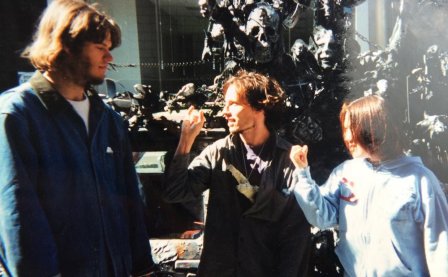Deerhoof faked me out when I saw them play in Chicago last year. After the band had taken the stage, when Greg Saunier raised his drumsticks high above his kit, I thought he was going to start the show by striking the cymbals really hard. But he didn’t. The set opened with “Fresh Born,” which starts quietly and goes through a few barely related louder sections before reaching a roaring climax at the end. The climax completes the song, but the song doesn’t prepare you for it. You don’t see it coming, but it comes at you all the same, all at once. At almost any point during the show, you could see Saunier and his lanky frame sitting behind his modest drum kit with a huge grin on his face, as if he was in on a joke. But even though this band boasts an adorable lead singer, a few silly songs about dogs and basketballs, and a reputation for unapologetic weirdness, they’re not joking. I mean, have you ever heard “Eaguro Guro”? There are some bands that present their quirky identities as conversation pieces, but Deerhoof are different; you’ll still be listening to them even after you’ve grown bored of discussing their affectations, after you’ve grown accustomed to the cheaper thrills that fill their spazzy, maniacal compositions. Deerhoof may leave you smiling, but they aren’t joking.
At this point, 16 years into their career, the fact that they’re making “mature” albums doesn’t mean their impulses have cooled off or their sound has dulled. For Deerhoof, maturity means something else: the control of impulse and the manipulation of sound have started to develop their own code. And this code isn’t ruled by method, but by expectations.
As for the new record, Deerhoof vs. Evil, there are plenty of new sounds and textures, but maturity isn’t about novelty; it’s nothing new for Deerhoof to write a song like “The Merry Barracks.” Like a new level in a video game, the song uses its own devices to warn you every time something surprising and new is going to happen, but it never gives you enough information to predict what that something is. It is, however, a little strange for them to leap from the laid-back rock groove on “Barracks” into “No One Asked To Dance,” a beatless song wallpapered with the Spanish tinge of strummed acoustic guitars. It’s strange not just because it comes out of nowhere, but because both this song and its predecessor operate according their own intricate, thoroughly developed internal logic. And by logic, I don’t mean a formal rigidity — these musicians are anything but rigid — but a clear idea of sound that the musicians follow through to consummation. Deerhoof are spazzy, but not sloppy, and their execution is as serious as the atomic bomb on the album cover.
There’s no linear narrative guiding the shapes of Deerhoof’s individual songs, and in a similar way, there’s no clear thread of development that fits the progression of their albums. The differences between vs. Evil and its predecessor Offend Maggie are clear enough: the newer record is less drunk on fuzz and guitar, less given to classic rock tropes, more discrete and worldly. Its newly discovered self-control doesn’t stand in the way of absurdity, though. Absurdity is hiding around every corner. It’s hiding there, and it’s smiling at you. The clearest example is “Hey I Can,” a riddle in three parts: the first section sounds like it was lifted from a Konono Nº1 record, the second features lead singer Satomi Matsuzaki singing the word “Hey” over a dozen times in a row while the guitars ping pong octaves against each other in the background, and the third is an upbeat pop section with glittering synths whose lyrics consist entirely of repetitions of “I can,” “love,” and “fun.” It’s also delightful to hear Matsuzaki sing things like “This is a stick-up! Smash the windows!” over “I Did Crimes For You,” with its handclap-laced verse and a chorus that reminds me of U2 (until the chords start getting dissonant). vs. Evil features songs written in three different languages (the opening track is in Catalan, a couple others are in Japanese), but this is not the only sense in which it could be called multilingual. “Qui Dorm, Només Somia” speaks Dirty Projectors, “Let’s Dance The Jet” speaks Greek film score (it’s a cover), and “Almost Everyone, Almost Always,” speaks modern anxiety. Let’s hear it for versatility!
But seriously, all that talk about diverted expectations, execution, and internal logic is just my desperate way of trying to justify one simple fact: Deerhoof offer musical pleasures that I haven’t found anywhere else. It’s a similar type of pleasure that some people find in classical music, where the setting and gradual transformation of a piece’s themes are often more important than the themes themselves. In Offend Maggie, this element of compositional prowess was raw and nakedly ambitious, unfolding with prog-ish bluster in minor masterpieces like “Buck and Judy” and “Numina O.” But vs. Evil relies more on flexibility than bare muscle. “Must Fight Current” threads two simultaneous vocal melodies through a brainy, angular chord progression that winds down to a strange aural oasis where Matsuzaki repeatedly chants “snow magic” against guitarist John Dieterich’s incantation of something that sounds like a nursery rhyme. In its own way, this hushed section is as devastatingly brilliant as the roaring climax on “Fresh Born.” Maybe even more so, because you probably weren’t expecting it.
More about: Deerhoof




